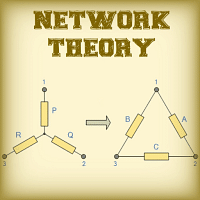Electrical Engineering (EE) Exam > Electrical Engineering (EE) Questions > If a travelling-wave travelling along a loss-...
Start Learning for Free
If a travelling-wave travelling along a loss-free overhead line does not result in any reflection after it has reached the far end, then the far end of the line is
- a)open circuited
- b)short circuited
- c)terminated into a resistance equal to surge impedance of the line
- d)terminated into a capacitor
Correct answer is option 'C'. Can you explain this answer?
| FREE This question is part of | Download PDF Attempt this Test |
Verified Answer
If a travelling-wave travelling along a loss-free overhead line does n...
When end of line is terminated in to a resistance equal to surge impedance of the line then no Reflection takes place.
Most Upvoted Answer
If a travelling-wave travelling along a loss-free overhead line does n...
Explanation:
When a traveling wave reaches the far end of an overhead line, it can either get reflected back or get absorbed by the load at the far end. In this scenario, if the traveling wave does not result in any reflection after reaching the far end, it means that the far end of the line is terminated into a resistance equal to the surge impedance of the line.
Surge Impedance:
Surge impedance is the characteristic impedance of a transmission line when it is infinitely long. It is given by the formula:
Zs = √(L/C)
where Zs is the surge impedance, L is the inductance per unit length, and C is the capacitance per unit length of the line.
Explanation:
When a traveling wave reaches the far end of the line, it encounters the termination impedance. If the termination impedance is equal to the surge impedance of the line, there will be no reflection of the wave. This means that the wave will be completely absorbed by the termination impedance without any energy being reflected back.
Open Circuit:
If the far end of the line is open-circuited, the termination impedance becomes infinite. In this case, the traveling wave will be completely reflected back towards the source.
Short Circuit:
If the far end of the line is short-circuited, the termination impedance becomes zero. In this case, the traveling wave will also be completely reflected back towards the source.
Terminated into a Capacitor:
If the far end of the line is terminated into a capacitor, the termination impedance becomes purely capacitive. This will result in a partial reflection of the traveling wave.
Terminated into a Resistance equal to Surge Impedance:
When the far end of the line is terminated into a resistance equal to the surge impedance of the line, the termination impedance matches the characteristic impedance of the line. This results in complete absorption of the traveling wave without any reflection.
Conclusion:
In this scenario, if the traveling wave does not result in any reflection after reaching the far end, it indicates that the far end of the line is terminated into a resistance equal to the surge impedance of the line.
When a traveling wave reaches the far end of an overhead line, it can either get reflected back or get absorbed by the load at the far end. In this scenario, if the traveling wave does not result in any reflection after reaching the far end, it means that the far end of the line is terminated into a resistance equal to the surge impedance of the line.
Surge Impedance:
Surge impedance is the characteristic impedance of a transmission line when it is infinitely long. It is given by the formula:
Zs = √(L/C)
where Zs is the surge impedance, L is the inductance per unit length, and C is the capacitance per unit length of the line.
Explanation:
When a traveling wave reaches the far end of the line, it encounters the termination impedance. If the termination impedance is equal to the surge impedance of the line, there will be no reflection of the wave. This means that the wave will be completely absorbed by the termination impedance without any energy being reflected back.
Open Circuit:
If the far end of the line is open-circuited, the termination impedance becomes infinite. In this case, the traveling wave will be completely reflected back towards the source.
Short Circuit:
If the far end of the line is short-circuited, the termination impedance becomes zero. In this case, the traveling wave will also be completely reflected back towards the source.
Terminated into a Capacitor:
If the far end of the line is terminated into a capacitor, the termination impedance becomes purely capacitive. This will result in a partial reflection of the traveling wave.
Terminated into a Resistance equal to Surge Impedance:
When the far end of the line is terminated into a resistance equal to the surge impedance of the line, the termination impedance matches the characteristic impedance of the line. This results in complete absorption of the traveling wave without any reflection.
Conclusion:
In this scenario, if the traveling wave does not result in any reflection after reaching the far end, it indicates that the far end of the line is terminated into a resistance equal to the surge impedance of the line.
Attention Electrical Engineering (EE) Students!
To make sure you are not studying endlessly, EduRev has designed Electrical Engineering (EE) study material, with Structured Courses, Videos, & Test Series. Plus get personalized analysis, doubt solving and improvement plans to achieve a great score in Electrical Engineering (EE).

|
Explore Courses for Electrical Engineering (EE) exam
|

|
Similar Electrical Engineering (EE) Doubts
If a travelling-wave travelling along a loss-free overhead line does not result in any reflection after it has reached the far end, then the far end of the line isa)open circuitedb)short circuitedc)terminated into a resistance equal to surge impedance of the lined)terminated into a capacitorCorrect answer is option 'C'. Can you explain this answer?
Question Description
If a travelling-wave travelling along a loss-free overhead line does not result in any reflection after it has reached the far end, then the far end of the line isa)open circuitedb)short circuitedc)terminated into a resistance equal to surge impedance of the lined)terminated into a capacitorCorrect answer is option 'C'. Can you explain this answer? for Electrical Engineering (EE) 2024 is part of Electrical Engineering (EE) preparation. The Question and answers have been prepared according to the Electrical Engineering (EE) exam syllabus. Information about If a travelling-wave travelling along a loss-free overhead line does not result in any reflection after it has reached the far end, then the far end of the line isa)open circuitedb)short circuitedc)terminated into a resistance equal to surge impedance of the lined)terminated into a capacitorCorrect answer is option 'C'. Can you explain this answer? covers all topics & solutions for Electrical Engineering (EE) 2024 Exam. Find important definitions, questions, meanings, examples, exercises and tests below for If a travelling-wave travelling along a loss-free overhead line does not result in any reflection after it has reached the far end, then the far end of the line isa)open circuitedb)short circuitedc)terminated into a resistance equal to surge impedance of the lined)terminated into a capacitorCorrect answer is option 'C'. Can you explain this answer?.
If a travelling-wave travelling along a loss-free overhead line does not result in any reflection after it has reached the far end, then the far end of the line isa)open circuitedb)short circuitedc)terminated into a resistance equal to surge impedance of the lined)terminated into a capacitorCorrect answer is option 'C'. Can you explain this answer? for Electrical Engineering (EE) 2024 is part of Electrical Engineering (EE) preparation. The Question and answers have been prepared according to the Electrical Engineering (EE) exam syllabus. Information about If a travelling-wave travelling along a loss-free overhead line does not result in any reflection after it has reached the far end, then the far end of the line isa)open circuitedb)short circuitedc)terminated into a resistance equal to surge impedance of the lined)terminated into a capacitorCorrect answer is option 'C'. Can you explain this answer? covers all topics & solutions for Electrical Engineering (EE) 2024 Exam. Find important definitions, questions, meanings, examples, exercises and tests below for If a travelling-wave travelling along a loss-free overhead line does not result in any reflection after it has reached the far end, then the far end of the line isa)open circuitedb)short circuitedc)terminated into a resistance equal to surge impedance of the lined)terminated into a capacitorCorrect answer is option 'C'. Can you explain this answer?.
Solutions for If a travelling-wave travelling along a loss-free overhead line does not result in any reflection after it has reached the far end, then the far end of the line isa)open circuitedb)short circuitedc)terminated into a resistance equal to surge impedance of the lined)terminated into a capacitorCorrect answer is option 'C'. Can you explain this answer? in English & in Hindi are available as part of our courses for Electrical Engineering (EE).
Download more important topics, notes, lectures and mock test series for Electrical Engineering (EE) Exam by signing up for free.
Here you can find the meaning of If a travelling-wave travelling along a loss-free overhead line does not result in any reflection after it has reached the far end, then the far end of the line isa)open circuitedb)short circuitedc)terminated into a resistance equal to surge impedance of the lined)terminated into a capacitorCorrect answer is option 'C'. Can you explain this answer? defined & explained in the simplest way possible. Besides giving the explanation of
If a travelling-wave travelling along a loss-free overhead line does not result in any reflection after it has reached the far end, then the far end of the line isa)open circuitedb)short circuitedc)terminated into a resistance equal to surge impedance of the lined)terminated into a capacitorCorrect answer is option 'C'. Can you explain this answer?, a detailed solution for If a travelling-wave travelling along a loss-free overhead line does not result in any reflection after it has reached the far end, then the far end of the line isa)open circuitedb)short circuitedc)terminated into a resistance equal to surge impedance of the lined)terminated into a capacitorCorrect answer is option 'C'. Can you explain this answer? has been provided alongside types of If a travelling-wave travelling along a loss-free overhead line does not result in any reflection after it has reached the far end, then the far end of the line isa)open circuitedb)short circuitedc)terminated into a resistance equal to surge impedance of the lined)terminated into a capacitorCorrect answer is option 'C'. Can you explain this answer? theory, EduRev gives you an
ample number of questions to practice If a travelling-wave travelling along a loss-free overhead line does not result in any reflection after it has reached the far end, then the far end of the line isa)open circuitedb)short circuitedc)terminated into a resistance equal to surge impedance of the lined)terminated into a capacitorCorrect answer is option 'C'. Can you explain this answer? tests, examples and also practice Electrical Engineering (EE) tests.

|
Explore Courses for Electrical Engineering (EE) exam
|

|
Suggested Free Tests
Signup for Free!
Signup to see your scores go up within 7 days! Learn & Practice with 1000+ FREE Notes, Videos & Tests.
























